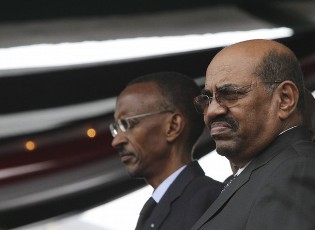Sudan’s al-Bashir hails Rwanda stance against ICC
December 20, 2017 (KHARTOUM) – The Sudanese President Omer al-Bashir has praised Rwanda’s support for Sudan in regional and international forums and its firm stance against the International Criminal Court (ICC).

In his address before the opening session of the Sudanese-Rwandan talks at the Presidential Palace on Wednesday, al-Bashir called on the African leaders to withdraw from the ICC according to the African Union decision.
The ICC issued two arrest warrants against al-Bashir in 2009 and 2010 for alleged war crimes, crimes against humanity and genocide committed in Darfur. He is the first sitting head of state charged by the Hague-based court since its inception in 2002.
Sudan, which is not a state member of Rome Statute of the ICC, has been campaigning for an African withdrawal from the court.
The African Union constantly accuses the ICC of disproportionately targeting Africans. Several countries including Kenya, Sudan, Eritrea, Uganda, Zimbabwe and Libya have called for en mass withdrawal of African nations from the court.
But the court also has supporters in Africa. At an African Union summit meeting in July 2016, the Democratic Republic of Congo, Ivory Coast, Nigeria, Senegal and Tunisia were among the countries that opposed a Kenyan-led drive for a group walkout from the tribunal.
Rwanda is not a state party to the tribunal of war crimes but has the obligation as a member of the United Nations to cooperate with the court. However, like many other African capitals, Kigali is critical to ICC and to its focus on Africa.
In 2008, President Kagame called the ICC a “fraudulent institution “that is “made for Africans and poor countries” who did not realize what they were signing up for when they ratified the Rome Statute.
Established in 2002 to try war criminals and perpetrators of genocide never tried at home, the ICC has opened inquiries involving nine nations, including Kenya, Ivory Coast, Libya, Sudan, Democratic Republic of Congo, Central African Republic, Uganda, Mali and, most recently, Georgia.
RWANDA AND THE UNAMID
Meanwhile, the Sudanese President hailed Rwanda’s efforts to achieve peace and stability in the continent through its effective participation in the peacekeeping missions.
“We especially praise the active participation of the Rwandan forces within the UNAMID in Darfur which contributed to enhancing state efforts to achieve security and stability across Darfur and ensure the success of the disarmament campaign,” he said.
The hybrid peacekeeping mission in Darfur (UNAMID) has been deployed since December 2007 with a mandate to stem violence against civilians in western Sudan’s region of Darfur.
It is the world’s second-largest international peacekeeping force with an annual budget of $1.35 billion and almost 20,000 troops.
UN agencies estimate that over 300,000 people were killed in Darfur conflict, and over 2.5 million were displaced.
(ST)
